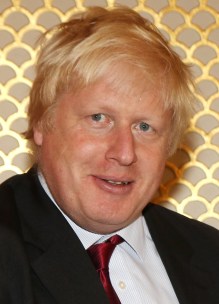When, just after winning her third term, Margaret Thatcher said, “There is no such thing as society”, the bien pensant brigade had a fit.

That only goes to show, they croaked, that the Iron Lady was preaching the 17th century adage of every man for himself and the devil take the hindmost. That’s the Tories for you.
But then everything Mrs Thatcher said received the same treatment. Had she observed that the sky is blue, she would have been accused of contaminating meteorology with Tory propaganda.
The bien pensant brigade, alas, includes not only unapologetic lefties, but nowadays also crypt-socialists calling themselves Conservatives. This Boris Johnson proved yesterday, by misinterpreting Mrs Thatcher’s statement in the light of current wokishness.
That 750,000 people, along with 20,000 retired medics, volunteered to help out the NHS, he said, proves that there is such a thing as society. Actually, it proves nothing of the sort.
His statement, on the other hand, does prove that – coronavirus or no coronavirus – Margaret Thatcher’s valiant attempt to return Britain to a semblance of solvency will be stamped into the dirt by Johnson’s populist commitment to a vast, socialist and ultimately ruinous state.
Those 770,000 noble people don’t prove the existence of society. They prove the vestigial existence of charity and solidarity – the same virtues that Margaret Thatcher not only extolled but actively tried to promote.
These are concrete Christian virtues that are part and parcel both of doctrine and the way of life universally accepted, if not always universally followed, in Christendom.
By way of refinement, the post-Christian world came up with the idea of society as part of its general tendency to replace specific notions with nebulous constructs. Society is one such.
To illustrate this point, Adam Smith, the quintessential figure of the Scottish, and generally British, Enlightenment, explained that society “may subsist among different men, as among different merchants, from a sense of its utility without any mutual love or affection, if only they refrain from doing injury to each other.”
One can only repeat Lord Byron’s quip: “I wish he would explain his Explanation.” ‘Society’ thus denotes any group whose members may hate one another but refrain from mass violence for some purely practical reason, such as fear of the police or of retribution.
Smith’s definition is too narrow to mean anything of substance. Today, on the other hand, most people define society too broadly. Society to them is an amorphous term that implies a much wider homogeneity and consensus than anything that exists in real life.
Modernity hates Christianity, with its specific demands on piety and behaviour, but loves loose concepts that can mean anything one could wish to read into them. Another such term is public opinion, which has nothing to do with what the public thinks.
In fact, the public doesn’t think; only individuals do. What’s called public opinion is in fact the opinion of a tiny elite formed by a couple of dozen journalists (mostly broadcast), a couple of dozen politicians, a couple of dozen ‘celebrities’ and perhaps a smattering of academics. Let’s say 100 people all in. A bit thin for public opinion, wouldn’t you say?
Society is another such arbitrary construct. Whenever it means anything at all, which is rare, it stands for a paternal, collectivist state. That’s how, for example, it’s used in today’s jurisprudence, where countless barristers repeat the same mantra on behalf of their thuggish clients: it’s all society’s fault.
That means the state hasn’t pumped enough money into fostering the already vast parasitic class. The essential Christian notions of individual responsibility, self-reliance and free will are as alien to modernity as the ‘mutual love and affection’ Adam Smith discarded as superfluous to society.
Margaret Thatcher’s consciousness was strongly affected by Christianity, specifically its Protestant variety. For her, self-sufficiency, thrift and hard work were cardinal and indisputable virtues.
I don’t know if she read Max Weber’s book The Protestant Ethic and the Spirit of Capitalism, but Weber would have approved of every ethical aspect of what’s inaccurately called Thatcherism.
Her remark on society was aimed against reliance on an omnipotent state as the panacea for all social and economic ills. Not only did that statement not preclude mutual assistance, charity and communal spirit, but it ineluctably implied it – just as the Christian concept of subsidiarity presupposes solidarity.
Johnson’s calculated slur on Thatcher wasn’t an offhand remark. It was a signal of a cardinal shift to a post-Thatcher, Cameron-style Conservatism that’s indistinguishable from Blair’s crypto-centristic socialism, with its rampant spivocratic statism.
That such a signal would have to be sent became clear when Johnson’s government unveiled its first profligate budget, a guaranteed road to a shining future of impotent individual and omnipotent state.
The kind of state, in other words, that serves mainly itself, not the public. It’s the operators and mechanics of the state who are the society that Margaret Thatcher railed against.
There are no political forces in the UK to resist this ruinous shift. And coronavirus provides a dense smokescreen behind which transition to, at best, Blairism can proceed apace. This is the public tragedy of coronavirus, standing apart from the individual tragedies of untimely deaths and the immediate economic devastation.
And, while we are on the subject of signals emanating from the government, note the slogan ‘Help the NHS’ prominently exhibited everywhere. Margaret Thatcher would have said ‘Help your neighbour’. But then she came from a different world.








